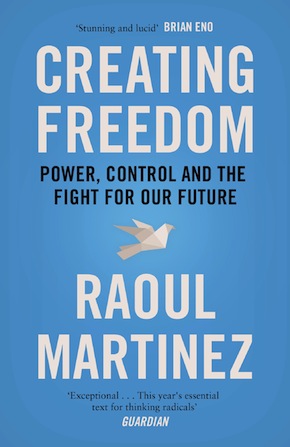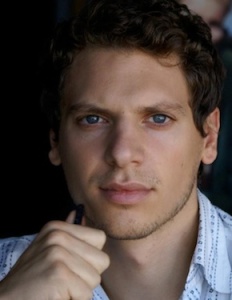Freedom from democracy
by Raoul Martinez
“A brilliant and timely analysis of our political landscape and the ideals which should inform how we reshape the world.” Helena Kennedy, QC
The electoral process has often been compared to a marketplace in which ideas are sold by parties to voters who make their consumption choices in the voting booth. In his compelling study of American democracy, Golden Rule (1995), US political scientist Thomas Ferguson argues that we need ‘a different account of political systems in which business elites, not voters, play the leading part’. According to Ferguson, most voters possess extremely limited resources as well as insufficient and often inaccurate information. The ‘market’ for political parties ‘is defined by major investors who generally have good and clear reasons for investing to control the state… Blocs of major investors define the core of political parties and are responsible for most of the signals the party sends to the electorate.’
Attracting wealthy ‘investors’ has become a matter of political survival. In 1999, Jim Nicholson, chairman of the Republican Party, wrote to the CEO of pharmaceutical company Bristol-Myers Squibb to request a donation of $250,000, explaining that ‘we must keep the lines of communication open if we want to keep passing legislation that will benefit your industry’. There can be no doubt about the motives and expectations of corporations when they donate money to political parties. Legally obliged to maximise their profits, the only way they can justify their political contributions to shareholders is as a financial investment on which a return can be expected. Legal scholar Joel Bakan explains that the money corporations ‘spend on the political process is a business expense, an investment in creating a political environment that promotes their profitability and thus helps them survive’.
In August 2015, The New York Times revealed that ‘[f]ewer than 400 of the nation’s most affluent families have supplied almost half of the money raised… by presidential candidates in both parties’. Where consensus exists among major investors little, if any, debate will be had between major parties. As Ferguson puts it, ‘if all major investors happen to share an interest in ignoring issues vital to the electorate, such as social welfare, hours of work, or collective bargaining, so much the worse for the electorate’.
According to a YouGov poll, a majority of voters in Britain – including four out of every ten Conservative voters – support a top rate tax of 75 per cent, but no major party has endorsed such a policy. Another poll showed that 60 per cent of Britons want the minimum wage to be raised to the living wage; 70 per cent support the renationalisation of energy companies; and two-thirds support the renationalisation of Royal Mail and the railways. Before the surprise election of Jeremy Corbyn as leader of the Labour Party in 2015 – a systemic anomaly that has greatly expanded the range of policies offered to the electorate – these options have long been omitted from the mainstream because they fell beyond the consensus of the political system’s major investors. These examples, and countless others, are evidence of a system in which influence is exerted in proportion to wealth rather than votes. Vast economic inequality yields vast political inequality.
Like the magician who lets you choose a card, but knows in advance what it will be, corporations have become adept at manufacturing political outcomes. The illusion of freedom is maintained, while the reality of control is concealed.”
When the term ‘free’ is used, we need to ask ‘free from what?’. In the case of the free market, it denotes a market free from democratic control. The logical conclusion to this process is the complete subjugation of national sovereignty to multinational corporate interests. For much of the developing world, this has long been the case. Under the banner of international trade agreements, we are now witnessing the same thing happening in wealthy nations. At the forefront of these developments are deals such as the Transatlantic Trade and Investment Partnership (TTIP). Intended to unify the regulatory frameworks of the US and European Union, TTIP proposed to enshrine in law the sovereignty of corporate profit over nations and peoples, creating international courts where large corporations can sue governments that – in the process of protecting their citizens – threaten potential profits. The will of democratically elected representatives would be subordinated to the decisions of corporate lawyers acting as judges in secret hearings – no rights of appeal would be granted to those communities affected by these decisions. Precedents for these secretive courts already exist, and many losing governments have already been forced to pay out vast sums in penalties. With the extension of trade deals like these, the power of governments to protect their own citizens, and the power of citizens to protect themselves, will rapidly disappear.
***
The tip of a pencil hovers over a ballot paper. The holder of the pencil can place a cross wherever they please. This is a moment of free democratic participation – a ‘free choice’. But this hallowed ritual conceals the fact that our apparently democratic choices have largely been divested of their meaning. The close cooperation, long-term planning and enormous wealth of a small elite have created an environment in which the democratic process is rigged to promote outcomes favourable to corporate short-term interests and private wealth.
While propaganda shapes public opinion, direct pressure is applied on government to restrict the options open to the electorate. These twin strategies constitute a powerful mechanism of control. Like the magician who lets you choose a card, but knows in advance what it will be, corporations have become adept at manufacturing political outcomes. The illusion of freedom is maintained, while the reality of control is concealed. Being tricked may be preferable to being coerced, but to speak of ‘freedom of choice’ is disingenuous, and to call it democracy is to debase the term.
Once a consensus is embedded deeply enough in the minds of politicians and civil servants, there is no real choice on offer in the ballot box. Given the regularity with which politicians break promises, the typically narrow range of choices presented is often illusory. As politicians of all stripes are keen to point out, governments are in thrall to corporations who at any time can leave the country, taking wealth and jobs with them if they feel conditions are becoming less favourable.
Vast wealth affords great political advantages to those who possess it, particularly when they work together to advance a common set of interests. It is not the best ideas but the best-funded ideas that win through.”
Marking a ballot takes a second and, once it’s done, a typical voter’s democratic participation ends until the next election. Yet corporate participation is continuous and on an industrial scale. The work of corporate lobbyists, think tanks and lawyers never ends; the revolving door between industry and government never stops spinning. The ‘debts’ to big campaign funders do not disappear, and neither does the influence of corporate funding in education and the media. Through numerous channels, vast wealth affords great political advantages to those who possess it, particularly when they work together to advance a common set of interests. It is not the best ideas but the best-funded ideas that win through. This is a politics of bribery, not participation. Yet the exercise of power through market mechanisms appears to be depersonalised, attributed not to individuals or even institutions but to sacred and impartial economic laws to which, we are told, there is no alternative. The enduring dominance of this doctrine is perhaps the greatest achievement of corporate public relations. By far the most powerful actor in the market, the corporation has every incentive to perpetuate the myth that government regulation is coercive, while markets – apparently characterised by voluntarism and cooperation – are not.
Thinkers like Friedrich Hayek drew a clear lesson from the devastating abuses across Europe under fascist and communist dictatorships: circumscribe state power. The state – with its monopoly on the use of coercive force – is certainly an immense source of concentrated power, but it is not the only one. The world’s largest corporations now possess more wealth than many nations. In 2010, the revenue of Walmart was greater than the GDP of all but twenty-three nations, including Denmark, Austria, Greece, Portugal, Israel and Malaysia. ExxonMobil’s revenue exceeded the GDP of Finland. In fact, in a list of the top 100 wealthiest economic entities on the planet in 2010, almost half were corporations. In light of these facts, it is nonsense to call for minimal state power in the name of individual liberty, while saying little or nothing of the comparable power of corporations, particularly when they have succeeded so well in co-opting the state and powerful international institutions. After all, a democratic state is, at least in theory, accountable to the people – a private corporation is not.
With its one-sided concern for avoiding concentrations of state power, neoliberal ideology has provided useful cover for big business. Brimming with ideals of freedom, voluntarism, choice and efficiency, it has masked the methodical struggle by corporations to extend and consolidate control. The point is not that the fear of state power is unwarranted, but that it only tells half the story. Concentrations of power, whether state or corporate, are always vulnerable to abuse.
1 After much lobbying, TTIP was abandoned in September 2016, but its spirit lives on in agreements such as the Canada-EU Comprehensive Economic and Trade Agreement (Ceta), which allows for any corporation that operates in Canada, wherever it is headquartered, to sue governments for restrictions to trade at an international tribunal.
This is an edited extract from Creating Freedom: Power, Control and the Fight for Our Future
 Raoul Martinez is a philosopher, artist, and award-winning filmmaker. Creating Freedom, his first book, is informed by over a decade of research and is accompanied by a documentary series of the same name. Episode one, The Lottery of Birth – produced, written and co-directed by Raoul – was nominated for Best Documentary at London’s Raindance Film Festival and went on to win the Artivist Spirit 2012 Award at Hollywood’s Artivist Festival. Raoul lives and works in London, where his paintings have been selected for exhibition in the National Portrait Gallery. Creating Freedom is out now in paperback and eBook from Canongate. Read more.
Raoul Martinez is a philosopher, artist, and award-winning filmmaker. Creating Freedom, his first book, is informed by over a decade of research and is accompanied by a documentary series of the same name. Episode one, The Lottery of Birth – produced, written and co-directed by Raoul – was nominated for Best Documentary at London’s Raindance Film Festival and went on to win the Artivist Spirit 2012 Award at Hollywood’s Artivist Festival. Raoul lives and works in London, where his paintings have been selected for exhibition in the National Portrait Gallery. Creating Freedom is out now in paperback and eBook from Canongate. Read more.
creatingfreedom.info
@CFreedom
The eBook of Creating Freedom is FREE to UK readers on the run-up to the 8 June General Election. Download now from Amazon, Kobo or iBooks.

